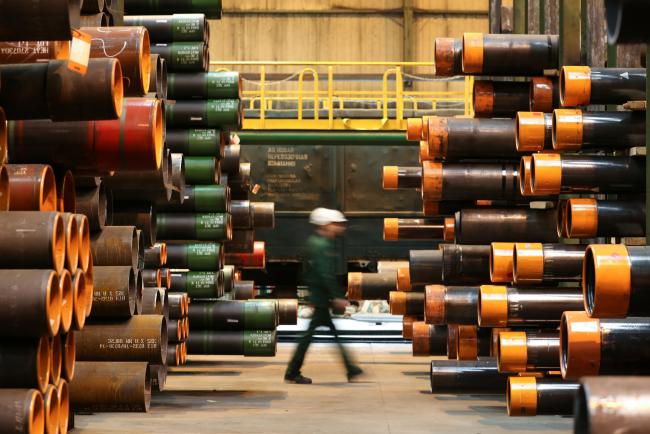(Bloomberg) -- Russia’s oil production rose to a post-Soviet high last month as the country completely rolled back the output cuts it had agreed on with OPEC, then pumped some more.
The country produced a record 11.356 million barrels of oil and condensate a day in September, according to data released Tuesday by the Energy Ministry’s CDU-TEK statistical unit. That’s an increase of almost 150,000 barrels a day from August and follows Russia’s June agreement with OPEC to boost supplies amid climbing prices.
OPEC itself raised output by 30,000 barrels a day last month as deepening losses in Iran were countered by other members, a Bloomberg survey showed.
Russia’s production exceeded the previous high of 11.247 million barrels a day reached two years ago. That shows the country has completely erased its 300,000-barrel-a-day cut agreed on with the Organization of Petroleum Exporting Countries in 2016, and has added over 100,000 barrels a day more.
“No surprise about Russia’s growth in capacities during the cutback, as investment continued apace, and so did upstream activity,” said Matthew Sagers, managing director of Russian and Caspian energy research at IHS Inc. “This has created an ‘overhang’ that will be further tapped in 2019.”
The nation’s production next year may increase by an average of 300,000 barrels a day, excluding seasonal factors, according to Sagers.
Energy Minister Alexander Novak said last month that the country had spare capacity to add more barrels if needed -- “a few hundred thousand barrels” -- yet a specific amount would depend on the market.
Rosneft, Sakhalin-1
Among Russia’s top producers, state-run Rosneft PJSC and the Sakhalin-1 project, led by Exxon Mobil Corp (NYSE:XOM)., were key drivers of September’s output boost, according to Bloomberg calculations based on the CDU-TEK data. Smaller companies also contributed, as other majors including Lukoil PJSC, Gazprom (MCX:GAZP) Neft PJSC and Surgutneftegas PJSC held output steady or even reduced supply.
Rising output from Russia -- and from OPEC partner Saudi Arabia -- hasn’t stopped oil prices from surging to an almost four-year high as losses from Iran boost supply concerns even before U.S. sanctions take effect in November. Brent crude rallied almost 10 percent in the past month, topping $85 a barrel on Monday for the first time since October 2014.
Novak is set to meet his Saudi counterpart Khalid Al-Falih in Moscow this week during an energy conference. The pair will meet after King Salman bin Abdulaziz of Saudi Arabia had a phone conversation with U.S. President Donald Trump at the weekend on maintaining stable oil supplies.
(Updates with analyst comment in fifth, sixth paragraphs.)
